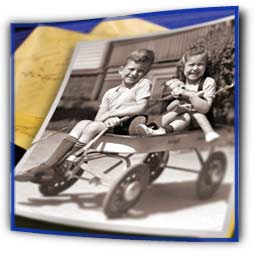
FEEL LIKE I’M TOUCHING the crown jewels,” I said as Martha* slowly, almost grudgingly, passed me an ancient envelope—paper yellowed, corners worn. Inside were two letters and a photograph. I had heard about them since my childhood and had come to believe they had exerted a major influence on the course of Martha’s life. Now I saw them for the very first time.
The first letter started: “Darling Daddy, Why haven’t you been home for so long? I miss you . . .” It was written in pencil with large, childish lettering. Some words had been erased and rewritten by the 7-year-old author.
The second letter was written in ink—with a fountain pen, I imagined, for the ink lines were very even. The handwriting was small, neat, and appeared to have been written by an adult. I read: “You may not understand now. . . . I am terribly busy. . . . I have another family now. . . . I think this is best, and maybe one day you will too. . . . Now study hard, be good.” The letter was dated 1947.
Along with returning his daughter’s letter, Martha’s father had sent her a photograph of his “other family.” It depicted two small children. A boy and a slightly younger girl, barely out of babyhood, posed for the camera, neatly dressed, hair blowing in the wind, smiling widely, and looking as if they didn’t have a care in the world.

I refolded the letters—almost reverently—and replaced them, along with the photograph, into the tattered envelope and passed it back to Martha.
Forever Memories
From her childhood Martha had fulfilled the “study hard, be good” parts of her father’s unwitting prophecy. She had excelled at her studies, qualified as a physician and then a medical specialist at an unusually young age—a feat unprecedented in her family. She was good to a fault. Never once did I hear of Martha being involved in any mischief. She maintained her religious faith in the face of opposition, and at times ridicule, at a state university. She prayed many times for reconciliation with her father, yet he continued to spurn all her attempts at reestablishing contact.
Martha continued to wonder: Why did my father reject me? Did I do something wrong to deserve this? What was he like? What about my half-siblings?
Years passed. Martha married and had children of her own, but she was not content to be relegated to the “mommy track.” Professionally she continued to fast-track forward into areas of teaching, research, and health-care management.
Eventually she received word that after a chronic and debilitating illness her father had passed away.
Parts of a Puzzle
Some of us onlookers were persuaded that much unanticipated good had come out of Martha’s rejection by her father. She had become an overachiever, perhaps on an unconscious level striving to become good enough to win her father’s recognition. But Martha still didn’t get it.

Periodically the topic of her father came up in conversation and she remained puzzled as to what her father was like and why he had rejected her so long ago.
The “I think this is best and maybe one day you will too” part of her father’s letter was a lot slower in fulfillment. Now these words were finally coming true—words of a renegade father who, during the upheavals of war, turned his back on his religion, his young wife, and his small children in order to enjoy the transient thrills of an illicit relationship.
On a recent trip Martha met the two half-siblings pictured in that 1947 photograph. They welcomed her warmly, saying that in his waning years their father had told them of additional family living overseas who may try to contact them. The two people from the photograph were incredulous when they heard of the two letters and a photograph. “We just don’t understand it,” they exclaimed. “He was always so warm with us. How could he do such a thing?”
They described him as being a loving, charismatic family man, who had a keen mind and a photographic memory. He had excelled in school and successfully completed a university degree. He had a successful career in a utility company, providing well for his family before he retired and began to have health problems.
Even though he was warm and caring, he couldn’t abide “small talk.” If the conversation degenerated into small talk, he would quietly leave the group, go aside, and often be found later reading a technical journal. They didn’t mention religious faith as they described the characteristics of Martha’s “daddy.”
Making Sense of the Past
Gesturing with the tattered envelope, Martha spoke reflectively. “You know, if I had been in contact with my father, I think it would have been very difficult for me to maintain my religious faith. I always felt different at home. My mother and sister loved to be with friends and socialize. I wanted to stay home and study. I recently learned that my father was like that too. I think I would’ve naturally been drawn to him and accepted the values he accepted.”
Martha was learning that in God’s bigger plan separation from her father may have been best for her temporal and eternal good.
But how God must have wept every time the child Martha prayed, “Lord, please bring my daddy to come home. I miss him.”
Questions for Reflection
1. What life event has brought you the most piercing disappointment? What questions did it bring to mind?2. Looking back from the perspective of hindsight, what lessons did you learn about yourself? About God?
3. What do you now know that you never would have known, had it not been for that disappointing or traumatic experience?
4. For what questions will you want answers when you get to talk to Jesus face-to-face? |
The Lord immediately had two problems. First, in order to make her daddy come home God would have to infringe on his right of free choice, something God chooses not to do (with rare exceptions).
Second, granting Martha’s prayer, even given with sincerity by a child of God, may have curtailed her influence for good in this life and potentially unfit her for life eternal.
The moral of a good story does not need to be explained. But permit me to do a little sermonizing.
If you are the offspring of a broken marriage and feel that you have been cheated out of a happy home, look to the good that might come out of that difficult experience. Maybe your experience will provide God with ways to develop and utilize latent skills you don’t even know you have.
If you are a parent thinking of breaking up a family without valid biblical reasons, consider deeply how such an action may have major and long-term effects on your children. In Martha’s story, that action rebounded for good, but frequently that’s not the case.
Finally, pray with care. Sometimes the well-meaning prayer of a sincere Christian can put God in a terrible bind. Even though our circumstances can look puzzling and unfair, God will generally not force the will of another person in order to answer our prayers. God can, however, bring much good out of unfortunate circumstances patiently endured.
______
*This is a true story. “Martha” is a pseudonym.
________________

 I refolded the letters—almost reverently—and replaced them, along with the photograph, into the tattered envelope and passed it back to Martha.
I refolded the letters—almost reverently—and replaced them, along with the photograph, into the tattered envelope and passed it back to Martha. Periodically the topic of her father came up in conversation and she remained puzzled as to what her father was like and why he had rejected her so long ago.
Periodically the topic of her father came up in conversation and she remained puzzled as to what her father was like and why he had rejected her so long ago.